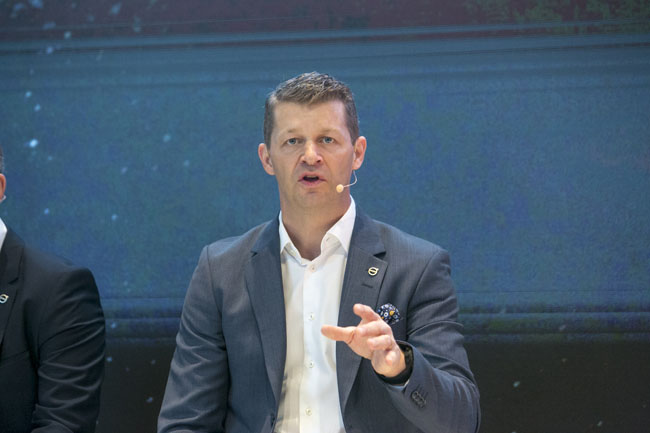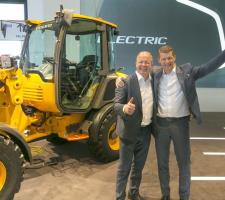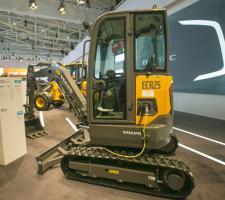
Melker Jernberg was a man in demand at bauma 2019. He greets me with a brief handshake and smile before politely asking if I minded if we talked while he ate a quick king prawn salad lunch in a meeting room within the large packed Volvo stand. I’d been offered 20 minutes with him just a couple of hours after the Volvo Group press conference. The well-attended event included Jernberg’s proud unveiling of Volvo CE’s first two commercial zero-emissions machines, the ECR25 excavator and the L25 wheeled loader. Both models will feature in the brand’s new range of electric compact models.
Volvo CE has designed the ECR25 excavator and the L25 wheeled loader with city-based construction projects in mind, designing them to deliver zero exhaust emissions, significantly lower noise levels, reduced energy costs, improved efficiency outputs and lower maintenance requirements.
From mid-2020, Volvo CE will begin to launch a range of electric compact excavators (EC15 to EC27) and wheeled loaders (L20 to L28), simultaneously stopping new diesel engine-based developments for these models.
I suggest to Jernberg that Volvo CE’s switch to producing only electric compact models for global market customers is bold, given the world’s varying access to reliable electric power supply.
He is quick to respond, “If you believe in a shift [from diesel to electric-powered units] you need to start to move. You cannot wait for everything to be ready to do something. We have to look at what we can influence; what we can do to build a better world and do good business for our customers.”
The launch of the ECR25 and L25 follow what Volvo CE said had been positive reactions to its concept machines over the last few years. This includes the prototype EX2 fully electric compact excavator and the prototype LX2 electric compact wheeled loader.
To make the ECR25 and L25 electric, old-fashioned combustion engines have been replaced with lithium-ion batteries. The ECR25 is fitted with lithium-ion batteries and one electric motor which powers the hydraulics.
The machine’s batteries store enough electric energy to power the ECR25 for eight hours in its most common applications, such as utility work. The L25 also incorporates lithium-ion batteries which allow for eight hours of operation in the machine’s regular applications, including light infrastructure work, gardening, landscaping and agriculture.
“We’ve sold the two models here at the exhibition,” says Jernberg. “The excavator sale was arranged before, but the wheeled loader was sold this morning off the stand. It was bought by a customer from Norway. I asked him why he bought it. He said ‘I believe in it. I believe in you. I would like to be a part of the change [from diesel to electric units].’ You can feel that these new machines are something that you want to be part of.”
In another big recent development on electric-powered machines, Volvo CE and its customer Skanska recorded ground-breaking results from their electric quarry site research project. The duo tested the viability of an all-electric powered machine site in a 10-week trial at Skanska’s Vikan Kross quarry, near Gothenburg, Sweden, from September to November 2018. The tests at what is Sweden’s second largest quarry are said to have shown a 98% reduction in carbon emissions, a 70% cut in energy cost and a 40% drop in operator cost. Volvo CE says the results indicate that the electric site project is a big step towards helping the company reach its future goal where work sites are ten times more efficient, with zero accidents, no unplanned stops and zero emissions. Overall, Volvo CE says the results support the potential for a 25% reduction in the total cost of operations.
Jernberg said, “After the electric quarry site trial we said, ‘Shall we now step back into our offices and wait to develop the results further?’ Of course, we said ‘No’. We have so much energy, knowledge and customer interest in what we achieved, so we built a copy of the quarry trial site back in Eskilstuna and are continuing our testing programme.”
Volvo CE is also conducting trials on the use of remote-controlled machines using the latest communications. The firm is working with Telia and Ericsson using a 5G network for industrial use today at Volvo CE’s facility in Eskilstuna. This is the first industrial use of 5G systems in Sweden, and one of the first for the off-highway machinery sector.
The Eskilstuna-based trials include the remote control of a conventional wheeled loader and further tests of the HX2 concept load carrier.
Jernberg said Volvo CE, which posted a 27% sales increase in 2018 (SEK 84,238m - €8,115bn) from SEK 66,313m - €6.388bn) in 2017, is working with an unnamed customer on plans to introduce the first commercial site using fully automated HX machines and electric compact excavators and wheeled loaders. The site is due to become operational at some stage in Q4 2019.
Focusing on Volvo CE’s heavier machine lines for quarrying customers, Jernberg said, “From a product range, we are stronger than ever – with our rigid and articulated haulers, excavators and wheeled loaders launched over the last two years. We are also pushing harder on our older and newer service packages through ActiveCare [a 24/7 machine monitoring and reporting service]. We also have new technology such as Haul Assist [an innovative technology which helps customers optimise their haul cycles] and our semi-autonomous EC220E excavator [with Volvo Active Control automated boom and bucket movements], both featured here this week.”
Under its bauma 2019 theme of Building Tomorrow, Volvo CE also showcased the company’s first-ever 20tonne crawler excavator, the EC200E, the innovative hydraulic-hybrid EC300E excavator, and the small but effective EC60E excavator, said to deliver big machine performance in a neat package. Volvo’s most compact pavers yet, the P2820D and P2870D, were also showcased alongside the new generation EW60E wheeled loader, the EC750E high-reach demolition excavator, and the flagship R100E rigid hauler.
Speaking about his post-bauma 2019 priorities, Jernberg said, “We had a super-strong market last year. We believe 2019 maybe a little bit slower, but still compare favourably with other periods within this latest business cycle. We are also preparing to be better prepared than during the last business cycle downturn. I don’t know when it will come, but you need to be prepared for it.
“We are also focusing on building an even better dealer and distributor network. The U.S., for example, is very important in terms of our distribution network. Where we would like to be even stronger product-wise is on our excavators.”
My 20 minutes were up. Jernberg had finished his rather nice-looking lunch. The time had come for Volvo CE’s president to dash off to the next meeting in his hectic bauma 2019 schedule, leaving behind much food for thought on what we may see next from one of the quarrying and construction equipment world’s biggest innovators.










